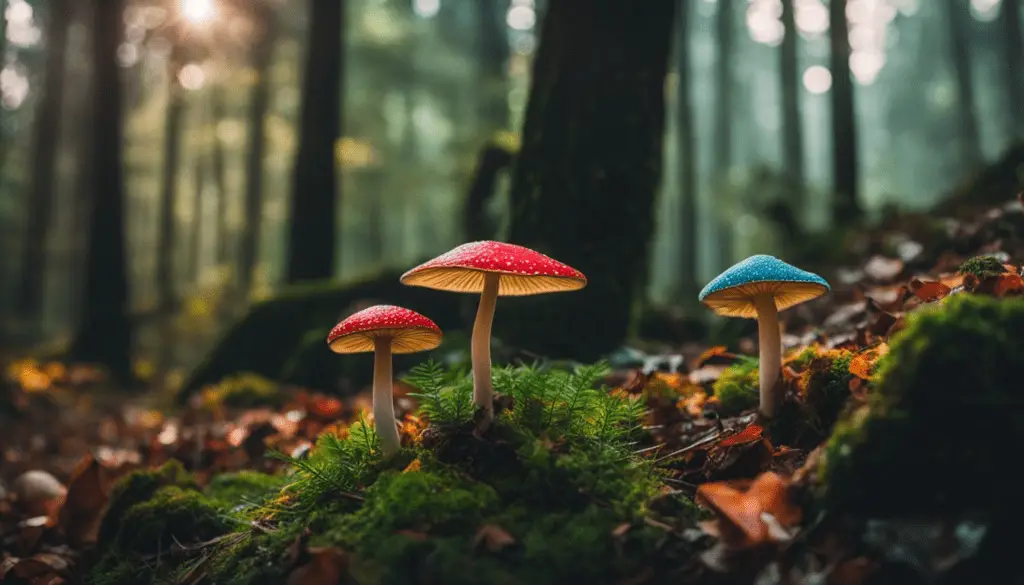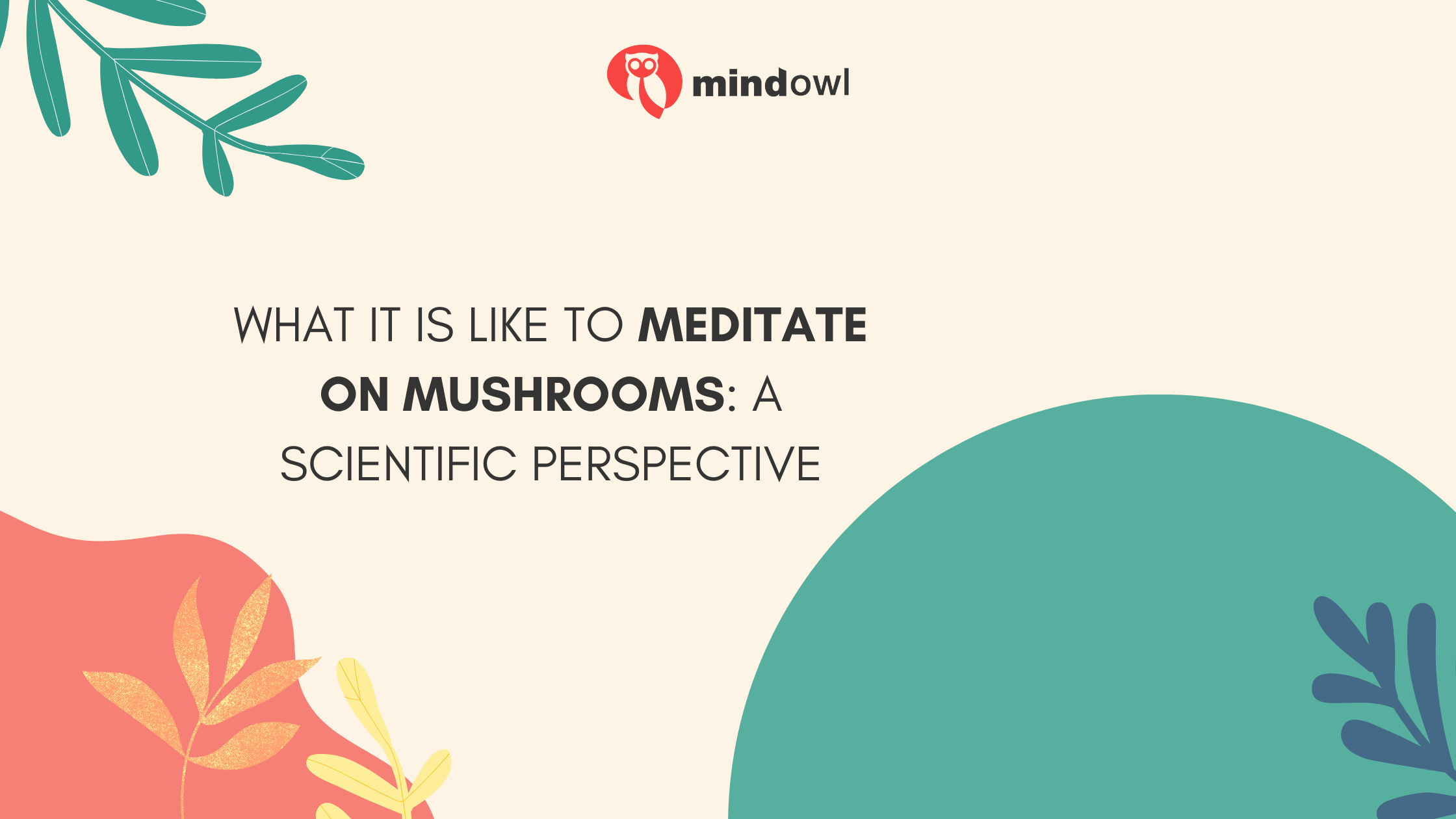
Many individuals search for new ways to deepen their self-awareness and find inner peace. Intriguingly, recent scientific studies suggest that magic mushrooms may have the potential to enhance meditative practices.
Our article delves into these findings, providing a glimpse of how psilocybin—the active ingredient in these fungi—might alter the meditation experience. Discover why researchers are so captivated by this synergy between ancient tradition and modern science.
Key Takeaways
- Magic mushrooms contain psilocybin which boosts brain connections, potentially helping with depression.
- Meditation and psychedelic drugs like psilocybin can induce states of pure consciousness and non-dual awareness, often leading to long-term positive changes in well-being and self-awareness.
- Studies suggest combining mindfulness meditation with psychedelics could have therapeutic uses for treating anxiety and depression.
- Researchers at Johns Hopkins found that meditation might increase the positive effects of psilocybin without causing anxiety.
- Regular meditation combined with psychedelics is linked to increased altruism and prosocial behaviors.
Understanding the Effects of Mushrooms

Mushrooms impact the brain, causing alterations in self-consciousness and perception. The intricate neural mechanisms involved in these effects continue to be a topic of scientific interest and exploration.
How mushrooms impact the brain
Magic mushrooms contain psilocybin, a substance that changes how the brain works. This compound boosts connections between different areas of the brain. Normally, these parts might not talk much to each other.
But when psilocybin steps in, there’s more chatter across usual boundaries. Studies show that this could help with tough problems like depression.
Roland Griffiths’ research at Johns Hopkins found that hallucinogens have potential for healing minds. They seem to unlock parts of the brain linked with spiritual experiences and deep thinking.
The effects can be strong and leave a lasting mark on people’s lives.
– Self-consciousness and perception alterations
Self-consciousness and perception alterations
Mushrooms can dramatically change how we see ourselves and the world. People often feel like their identity is fading or has completely disappeared after taking psychedelic drugs. This feeling is known as a reduced sense of self.
It leads to seeing things in new ways, not just during the experience but sometimes long after.
Scientists are curious about these changes. They study brain scans to learn more about what happens when someone meditates on mushrooms. Research shows that meditation combined with psilocybin can result in lasting shifts in consciousness.
These studies suggest that such practices might help treat conditions like depression by altering self-awareness and perception.
The Neuroscience of Meditation and Psychedelics

Recent studies have provided an overview of the neural correlates of both meditative practices and psychedelic states, shedding light on how these practices impact the brain. These findings offer valuable insights into understanding altered self-consciousness and its potential long-term outcomes.
An overview of recent studies
Recent studies have shed light on how meditation and psychedelics like psilocybin interact with the brain. These findings are changing what we know about mental health treatments.
- Scientists have explored the effects of classic psychedelics, such as LSD and psilocybin, on patients with depression and anxiety disorders.
- Research has shown that a single dose of psilocybin can lead to lasting positive changes in psychological functioning.
- Participants who engaged in mindfulness meditation experienced enhanced benefits from psilocybin compared to those who did not meditate.
- Studies examining the long-term effects of combining mindfulness practices with psychedelics report increases in altruism and prosocial behaviors.
- Researchers found that certain brain regions linked with self – consciousness were affected by both meditation and psychedelic substances.
- An experiment recruiting 40 meditation experts revealed that mindfulness training could amplify the positive impact of taking psilocybin.
- The synergistic effects of mindfulness meditation and psilocybin suggest potential therapy uses for depression and anxiety disorders.
- Investigations into neural correlates show similarities between meditative states and those induced by psychedelics, potentially leading to advances in understanding consciousness.
Neural correlates of meditative practices
Building on the insights from recent studies, scientists have turned their attention to what happens in the brain during meditation. They use advanced imaging techniques to see inside the meditator’s mind.
These images show changes in brain activity that are linked with deep relaxation and heightened awareness. During meditation, parts of the brain linked to attention become more active while areas associated with stress may show less activity.
Researchers also find that regular meditation practice can change certain patterns within the brain over time. This could explain why seasoned meditators often seem calmer and more centered than others.
It reveals how spiritual practices yield lasting effects on psychological well-being and consciousness itself.
Neural correlates of psychedelic states
Meditation can deeply change our mind, but psychedelics like LSD and psilocybin offer a different path. These substances spark vivid visions and alter thought patterns. Studies show that certain areas of the brain light up during psychedelic experiences.
The prefrontal cortex, which helps us think and plan, becomes more active. Meanwhile, communication across different brain regions increases dramatically.
This extra chatter in the brain might explain why people feel their senses blending together or see sounds as colors while under the influence of psychedelics. Classic psychedelics are being examined for psychotherapy because they could help patients see their problems in new ways.
Imaging studies confirm that these drugs cause shifts in neural activity that last beyond the immediate high; this has scientists excited about how mushrooms and meditation might work together to treat conditions like depression and anxiety.
Exploring Altered Self-Consciousness
Disruption of narrative and multisensory aspects can lead to altered self-consciousness when meditating on mushrooms. Understanding the neurological impact of this altered state is crucial for comprehending the effects of psychedelics and meditation.
Disruption of narrative aspects
Mushrooms can break the flow of our personal stories. They scramble how we connect thoughts about who we are. This messes with memories and ideas about ourselves. It’s like when people meditate deeply, their minds wander off script.
This wandering is similar to what happens when people take psychedelics.
Next, let’s dive into how mushrooms also mix up our senses and the way they work together.
Disruption of multisensory aspects
Magic mushrooms and meditation can change how we experience the world around us. Our senses usually work together, helping us understand our environment. But on mushrooms, this teamwork can get mixed up.
People might hear colours or see sounds. This is called ‘multisensory disruption.’ It’s like the brain’s normal rules for processing senses are bent or broken.
Studies show that mindfulness meditation without mushrooms also changes sensory experiences, but in a different way. Rather than mixing senses up, it makes people more aware of each sense separately.
Together, meditation and psychedelics could lead to even bigger changes in how we feel and understand our surroundings.
Now let’s explore what happens when you reach a state of pure consciousness and non-dual awareness through these practices.
Pure Consciousness and Non-Dual Awareness
Pure consciousness and non-dual awareness can be induced by both mushrooms and meditation, leading to a state of mind where the sense of self is transcended. This experience goes beyond ordinary perception, offering insights into the nature of reality and consciousness itself.
How mushrooms and meditation can induce these states
Mushrooms and meditation can induce states of pure consciousness and non-dual awareness. Studies propose that mindfulness meditation enhances the positive effects of a single dose of psychedelic drugs, such as psilocybin found in magic mushrooms.
These findings indicate the potential for combining mindfulness meditation with psychedelics to bring about enduring positive changes in psychological functioning and trait measures of prosocial attitudes and behaviours.
The synergy between these practices also intensifies self-transcendence without inducing anxiety, showing promise for therapeutic use in treating disorders like depression.
Furthermore, Tibetan frameworks have been suggested to inform the relationship between view, meditation, and action through consistent meditative practice or ritual ingestion of psilocybin mushrooms.
Toward a Multidimensional Model of Altered Self-Consciousness
Recent studies have shown that long-term outcomes of psychedelic experiences include selflessness as a trait, with potential therapeutic benefits, improved well-being, and increased prosociality.
These findings are leading towards the development of a multidimensional model to understand altered self-consciousness induced by mushrooms and meditation.
Long-term outcomes
Mixing magic mushrooms with meditation has been found to have long-term benefits, according to a study at Johns Hopkins. The practice of meditation may produce enduring positive outcomes related to altered self-consciousness and can lead to changes in psychological functioning and trait measures.
This approach shows promise for the treatment of depression and anxiety, emphasising the potential therapeutic uses of mindfulness meditation combined with psilocybin or other psychedelic drugs.
The study demonstrated that mindfulness training enhances the positive effects brought about by meditation and psychedelic experiences. It also indicated that combining mindfulness meditation with psilocybin virtually without inducing any anxiety compared to a placebo control group resulted in increased intensity of self-transcendence.
Selflessness as a trait
Psychedelics and meditation can prompt a “selfless” state of consciousness, emphasising an expanded awareness beyond oneself. This heightened sense of selflessness is believed to lead to lasting increases in traits such as mindfulness and well-being, aligning with the outcomes associated with regular meditation practice.
Altered states of consciousness brought about by mindfulness meditation may foster increased self-awareness, creativity, authenticity, as well as imparting a profound sense of purpose and significance in life.
Understanding the relationship between selflessness and altered states of consciousness presents crucial implications for interventions involving psychedelics and mindfulness. The emphasis on achieving a deeper comprehension of this connection underscores the transformative potential these practices hold for personal growth and psychological well-being.
Relation to therapeutic outcomes, well-being, and prosociality
Psilocybin, found in “magic mushrooms,” has shown the potential to enhance well-being and foster enduring increases in prosocial attitudes. Studies indicate that psilocybin use can lead to healthy psychological functioning, which aligns with the scoping review findings suggesting its positive effects on multifaceted well-being.
Moreover, mindfulness-based interventions and psychedelic treatments have individually demonstrated improvements in mental health and psychological well-being, offering promising paths for therapeutic outcomes.
The combination of psilocybin and meditation could further elicit enduring positive changes in individuals’ psychological functioning and prosocial behavior. This connection is supported by recent research highlighting the capacity of these practices to induce self-transcendence virtually without inducing adverse effects, signaling their potential impact on enhancing overall well-being while fostering positivity towards others.
Mindfulness Meditation and Psilocybin
A study showed that mindfulness meditation increased the positive effects of psilocybin or a placebo, indicating the potential for therapeutic uses. By combining mindfulness meditation and psilocybin, researchers recruited 40 meditation experts who were taking part in the study to explore how these practices produce enduring positive changes.
Study on enhanced positive effects
Meditation combined with psilocybin has shown enhanced positive effects, especially in treating depression and anxiety disorders. The study involved 40 meditation experts who were taking part in the research. The findings indicated that mindfulness meditation increased the positive effects of treating depression and anxiety disorders. This combination also led to an intensity of self-transcendence virtually without parallel. Furthermore, the research demonstrated that mindfulness training enhances psychological functioning and in trait measures, indicating potential for therapeutic uses.
Crash course in the nature of mind
Recent studies have revealed the potential for mindfulness meditation to enhance positive long-term effects on mental health. This points towards the profound impact of meditation and introspective practices on understanding and nurturing the nature of mind.
Understanding this connection can shed light on how certain mushrooms, such as psilocybin, may influence self-consciousness and perception, offering insights into altered states of consciousness with enduring implications for well-being.
Neuroplasticity research indicates that mindfulness training enhances enduring positive changes in different states of mind. Such findings highlight the potential benefits of combining meditation with drugs like psilocybin to explore altered self-consciousness and its relation to therapeutic outcomes and prosocial behavior.
Potential for therapeutic uses
Mindfulness meditation and psilocybin are under study for their potential therapeutic effects in treating depression and anxiety disorders. Studies indicate that mindfulness training enhances these positive long-term effects, suggesting an enduring impact on mental health and well-being.
There is a renewed interest in the clinical application of classic psychedelics, such as “magic mushrooms,” indicating promising avenues for addressing these pervasive mental health challenges.
Understanding how mindfulness meditation and psilocybin can enhance positive psychological outcomes offers hope for individuals struggling with anxiety and depression. These findings pave the way for further exploration into innovative treatment modalities, underscoring the potential to revolutionise mental healthcare practices.
Conclusion
In conclusion, the combination of meditation and psychedelic drugs is a subject of growing scientific interest. Recent studies have shown promising results in alleviating depression and anxiety disorders.
The exploration into the effects on brain function and altered self-consciousness continues to reveal new insights. These remarkable developments hold significant potential for therapeutic applications and well-being.
Future research directions may unveil further benefits of this intriguing intersection between meditation and psychedelics.
FAQs
1. What happens when you combine meditation with psychedelic drugs like psilocybin?
When people mix meditation and psychedelic drugs such as LSD or psilocybin, the ingredient in “magic mushrooms,” they may have deep mystical-type experiences that can lead to lasting positive changes.
2. Can meditation enhance the effects of “magic mushrooms”?
Studies suggest that different types of meditation can enhance the positive long-term effects of a single dose of psychedelic substances, making these spiritual practices more powerful.
3. Do the effects of combining meditation with psychedelics last?
Research indicates that this combination not only causes immediate changes but also produces enduring positive effects on well-being and mindset due to enhanced neuroplasticity from both practices.
4. What is known about mindfulness meditation and its impact on magic mushroom experiences?
Findings show that mindfulness meditation increased the intensity and benefits of a mystical-type experience in combination with substances like psilocybin found in “magic mushrooms.”
5. Are these enduring changes from meditating on mushrooms scientifically proven?
Scientific studies focusing on this area reveal that engaging in meditation and other spiritual practices together with psychedelic drugs often results in enduring alterations to one’s mental state.
Sources:
https://www.frontiersin.org/articles/10.3389/fpsyg.2018.01475/full
https://www.ncbi.nlm.nih.gov/pmc/articles/PMC6221271/
https://www.unom.ac.in/webportal/uploads/miscelloneous/cpsychology/1.pdf
MindOwl Founder – My own struggles in life have led me to this path of understanding the human condition. I graduated with a bachelor’s degree in philosophy before completing a master’s degree in psychology at Regent’s University London. I then completed a postgraduate diploma in philosophical counselling before being trained in ACT (Acceptance and commitment therapy).
I’ve spent the last eight years studying the encounter of meditative practices with modern psychology.

